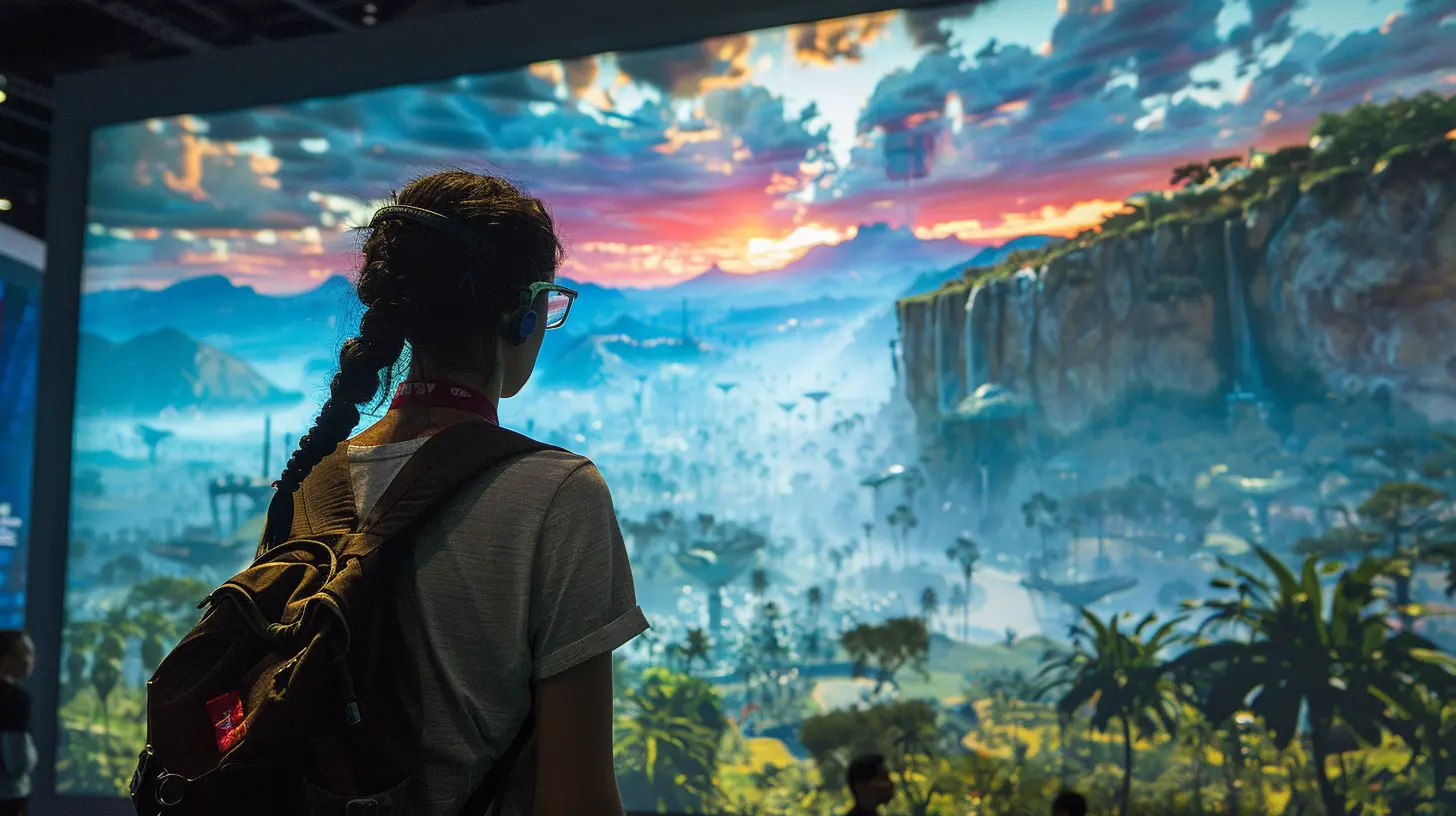Dynamic Storytelling Tech Demonstrated at Expo
23 September 2025
Imagine stepping into a video game where the story changes based on what you whisper, how you move, or even the expression on your face. Sounds like science fiction, right? Well, buckle up, because we’re getting pretty close to that reality. At a recent gaming expo, developers from around the globe showcased the next big leap in immersive gaming: dynamic storytelling technology. And let me tell you — it’s nothing short of mind-blowing.
If you’ve ever felt like game narratives were a bit too linear, predictable, or just a tad stale, this is the future we’ve all been waiting for. Whether you're a die-hard RPG fan, a casual gamer, or just tech-curious, this new wave of storytelling is about to change everything we thought we knew about narrative in gaming.
Let’s dive into what dynamic storytelling is, how it was demonstrated, and why it’s turning heads across the gaming industry.
What is Dynamic Storytelling?
Dynamic storytelling in games isn't just about branching narratives or multiple endings anymore. It's a whole new ballgame. We’re talking about AI-driven characters that remember your actions, adapt to your decisions, and create unique, personalized story arcs every single time you play.Instead of a script that plays out the same way for everyone, dynamic storytelling weaves the narrative based on your choices — both big and small. Think of it as a living, breathing novel that writes itself around you. You’re not just playing a story; you’re living it.
And the craziest part? No two players will experience the exact same tale. That’s right. Your decisions, your personality, and your playstyle shape the outcome, the characters, the world… everything.
The Big Reveal: The Expo That Had Everyone Talking
So, what exactly was shown off at the expo?Let me paint the picture: rows of flashy booths, glowing screens, booming speakers, and a massive crowd of excited gamers, journalists, and curious onlookers. But right in the center of all the chaos was a quiet hum of excitement surrounding a few select booths showcasing dynamic storytelling tech.
Studios like Nebula Interactive, Veridian Realms, and Hexbyte Studios rolled out jaw-dropping tech demos that dropped jaws and raised eyebrows. These weren’t your typical pre-rendered trailers either — these were live, hands-on demonstrations with real-time reactions and story shifts.
And let me tell you, the crowd was eating it up.
AI Characters That Talk Back (And Remember Stuff)
One of the most impressive demos came from Nebula Interactive with their upcoming RPG, “Echoes of Aetheria.” Picture this: you’re talking to an NPC (non-playable character), and instead of picking from a list of canned responses, you’re actually speaking to them — out loud.The character listens. Understands. Thinks. And then replies.
Yeah. Let that sink in for a second.
Even cooler? If you’re rude to them, they remember. If you’re kind, they’ll open up. And if you lie, they might catch you — or fall for it and find out later. This isn’t just voice recognition either; it’s full-on natural language understanding, powered by advanced machine learning models.
It’s like chatting with Siri… if Siri had a medieval backstory and a grudge against your ancestors.
Emotionally-Aware Games — Finally!
Remember that awkward moment when you make a “difficult decision” in a game but nothing really changes? Those days might be over.Veridian Realms showed off their prototype of a narrative-driven adventure called “Pulse,” and it's stunning. The game literally tracks your emotions — through facial recognition, voice tone, and even gameplay style — and adjusts the story accordingly.
For example, if you show fear in a confrontation scene, the NPC might take the upper hand. Or if you stay calm under pressure, the story might reward you with diplomatic options instead of combat.
It's like the game is watching you as closely as you're watching it.
Creepy? Maybe a little. Cool? Absolutely.
Every Choice Actually Counts
You’ve probably played games where you choose between “Good Guy” or “Bad Guy” paths, right? Yawn. Not here.Hexbyte Studios' open world fantasy title, “ChronoHarbor,” goes beyond that basic binary choice system. According to their demo, the game tracks dozens of variables — from how often you break promises to how loyal you are in friendships — and morphs the world accordingly.
Characters may betray you if you’ve lied too often. Townspeople might revere you or fear you based on your reputation. Even the monsters adapt to your combat tactics.
It’s like the game builds a psychological profile of you while you play. Wild stuff.
Procedural Narrative = Infinite Possibilities
Another buzzword flying around the expo floor? Procedural storytelling.Now, you’ve probably heard of procedural generation for stuff like maps or dungeons — but this goes way deeper. Developers are now applying procedural logic to narrative structures, meaning the story isn’t just hand-written. It’s grown.
Games can now randomize not just environments, but plot twists, character motivations, betrayals, romances, and more. So instead of following a fixed script, the game builds a storyline on the fly that still makes sense, feels cohesive, but is tailored to your experience.
It's like having a dungeon master in a tabletop RPG, but this one never sleeps and is plugged into your PC.
Let's Talk Tech: What’s Powering This Wizardry?
Glad you asked.At the heart of dynamic storytelling is a blend of powerful tech, including:
- Machine Learning Models: These analyze behavior patterns and predict likely narrative outcomes.
- Natural Language Processing (NLP): Allows games to “understand” spoken or typed dialogue.
- Emotion Tracking Systems: Using cameras, mics, or wearables to measure stress, tone, and even micro-expressions.
- Procedural Content Generators: Algorithmically generate content (quests, dialogue, character arcs) in real time.
- Cloud-based AI Integration: Offloads heavy computation to the cloud, making it accessible even for mid-tier hardware.
All of this might still be in its early stages, but make no mistake — the foundation is being laid right now.
What This Means for the Future of Gaming
So, where’s this all going?Well, we’re looking at a future where:
- Every playthrough is unique.
- NPCs form real connections with players.
- Games evolve over time, learning from you like a digital best friend (or nemesis).
- Storylines can surprise even the developers who created them.
This isn’t just about better graphics or bigger maps anymore. It’s about possibility. Games are becoming living worlds, shaped by our actions, thoughts, and personalities.
Imagine Skyrim, but where the story you experience is nothing like your friend’s — even though you both started in the same village.
The Challenges (Because Nothing’s Perfect, Right?)
Of course, dynamic storytelling isn’t all sunshine and dragon wings. There's still a lot to iron out.- Complexity: These systems are incredibly hard to build and balance.
- Hardware Limitations: Not every gamer has a rig ready for real-time emotion tracking.
- Privacy: Emotion tracking and always-on audio raise some eyebrows (and for good reason).
- Consistency Weirdness: Sometimes an AI storyteller might create tonal whiplash or odd plot holes.
But with constant innovation and smarter AI, most of these challenges are technical — not philosophical. Developers are already hard at work smoothing the rough edges.
So, Should You Be Hyped? (Short Answer: YES!)
Honestly? You should be seriously hyped.Dynamic storytelling is going to make games more alive, more personal, and more emotionally charged than ever before. Whether you prefer deep RPGs, narrative-driven indies, or sprawling open worlds, this tech is going to affect how stories are told in all game genres.
We’re talking about a revolution in game narrative — the kind that comes around once in a generation.
So yeah, next time someone says “games haven’t changed much lately,” point them straight to this tech. And watch their jaw drop.
Final Thoughts
Dynamic storytelling isn’t just a gimmick. It's a bold step into a new era of gaming that blurs the line between code and creativity, between player and protagonist. It’s where you’re not just a hero on a pre-written path — you’re the co-author of a story that adapts, surprises, and remembers you.And after what we saw at the expo? The future’s looking ridiculously exciting.
Grab your controller, put on your headset, and get ready — because the next game you play might just know you better than you know yourself.
all images in this post were generated using AI tools
Category:
Gaming News UpdatesAuthor:

Stephanie Abbott
Discussion
rate this article
1 comments
Justice McCray
Exciting times ahead for gaming stories!
September 28, 2025 at 3:41 AM

Stephanie Abbott
Absolutely! The future of gaming narratives looks incredibly promising with these advancements.


